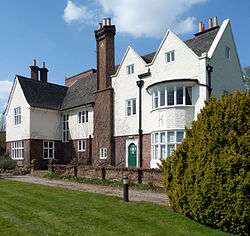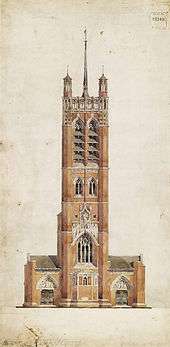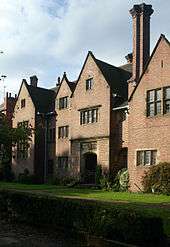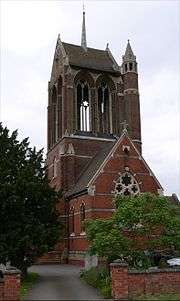William Bidlake
| William Henry Bidlake MA, FRIBA | |
|---|---|
 Garth House in Edgbaston, Birmingham, designed by the architect | |
| Born |
12 May 1861 Wolverhampton, England |
| Died |
6 April 1938 (aged 76) Wadhurst, Sussex, England |
| Education | Tettenhall College |
| Alma mater | |
| Occupation |
|
| Style | Arts and Crafts |
| Awards | RIBA Pugin Travelling Fellowship |

William Henry Bidlake MA, FRIBA (12 May 1861 – 6 April 1938) was an English architect, a leading figure of the Arts and Crafts movement in Birmingham and Director of the School of Architecture at Birmingham School of Art from 1919 until 1924.
Several of Bidlake's houses in the Birmingham area were featured in Hermann Muthesius's book Das englische Haus ("The English House"), which was to prove influential on the early Modern Movement in Germany.
Life and career
Bidlake was born in Wolverhampton, the son of local architect George Bidlake (1830-1892, from whom he received his earliest architectural training), and educated at Tettenhall College and Christ's College, Cambridge.[1] In 1882 he moved to London where he studied at the Royal Academy Schools and worked for Gothic Revival architects Bodley and Garner. In 1885 he won the RIBA Pugin Travelling Fellowship for his draughtsmanship, which enabled him to spend 1886 travelling in Italy.
On returning to England in 1887 Bidlake settled in Birmingham where he set up in independent practice and, from 1893, pioneered the teaching of architecture at the Birmingham School of Art. Famously ambidextrous, his party trick was to sketch with both hands simultaneously.
Bidlake designed many Arts and Crafts-influenced houses in upmarket Birmingham districts such as Edgbaston, Moseley, and Four Oaks (the latter then in Warwickshire and absorbed into Birmingham in 1974), along with a series of more Gothic-influenced churches such as St Agatha's, Sparkbrook – generally considered his masterpiece.
He was an associate, member, treasurer and, from 1902–1938, Professor of Architecture of the Royal Birmingham Society of Artists.[2]
In 1924, Bidlake married a woman over twenty years younger than himself and moved to Wadhurst in East Sussex, where he continued to practise until his death there[2] in 1938.
Major built works

- St Thomas' Church, Stourbridge. Apse (1890), north chancel screen (nd).[3]
- The Dene, 2 Bracebridge Road, Sutton Coldfield, Birmingham (1895-1896), Grade II listed[4]
- Woodside, 51 Bracebridge Road, Four Oaks, Sutton Coldfield (1898) - built for himself
- 17 Barker Road, Sutton Coldfield, Birmingham (1898), Grade II listed[5]
- St Oswald's Church, Small Heath, Birmingham (1892–9), Grade II* listed[6]
- 18 Dora Road, Small Heath, Birmingham (1899), Grade II listed[7]
- College of Art, Balsall Heath, Birmingham (1899), Grade II* listed[8]
- St Patrick's Church, Salter Street, Hockley Heath, Birmingham (chancel) (1899), Grade C listed[9]
- Woodgate, 37 Hartopp Road, Four Oaks, Sutton Coldfield (1900) - built for himself, Grade II listed[10]
- Garth House, 47 Edgbaston Park Road, Edgbaston, Birmingham (1901), Grade II* listed[11]
- The Hurst, 6 Amesbury Road, Moseley, Birmingham
- Emmanuel Church, Sparkbrook Birmingham (1901)
- St Agatha's Church, Stratford Road, Sparkbrook, Birmingham (1901), Grade I listed[12]
- 100 Sampson Road, Sparkbrook, Birmingham (St Agatha's Vicarage) (1901), Grade II* listed[13]
- St Winnow, 22 Ladywood Road, Sutton Coldfield, Birmingham (1902), Grade II listed[14]
- Bishop Latimer Memorial Church, Winson Green, Birmingham (1904)
- The Knoll, Glebe Road, Oadby, Leicestershire (1907), Grade II listed[15] and Stables, Grade II listed[16]
- St Andrew's Church, Oxhill Road, Handsworth, Birmingham (1907–9), Grade I listed[17]
- St Matthew's Church, Shuttington, Warwickshire (restoration) (1908-1909), Grade II listed[18]
- St Mary's Church, Wythall, Worcestershire. Roof and stair turret (nd).[19]
- Emmanuel Church, Wylde Green, Sutton Coldfield (1909), Grade C listed[20]
- Gates and four sets of gate piers to Handsworth Cemetery. (1909), Grade II listed[21]
- Lodge to Handsworth Cemetery (1909), Grade II listed[22]
- Mortuary Chapel, Handsworth Cemetery (1910)
- St Clears, 79 Farquhar Road, Birmingham (1914), Grade II listed[23]
- Sparkhill United Church, Stratford Road (1932–3)[24]
References
- ↑ "Bidlake, William Henry (BDLK878WH)". A Cambridge Alumni Database. University of Cambridge.
- 1 2 "William Henry Bidlake MA, FRIBA". Mapping the Practice and Profession of Sculpture in Britain and Ireland 1851-1951,. University of Glasgow. Retrieved 14 September 2013.
- ↑ The Buildings of England: Worcestershire, Nikolaus Pevsner, 1968 p268
- ↑ Historic England. "The Dene, 2 Bracebridge Road (473074)". Images of England. Retrieved 2 February 2014.
- ↑ Historic England. "17 Barker Road, Sutton Coldfield (216545)". Images of England. Retrieved 2 February 2014.
- ↑ Historic England. "St Oswald's Church, Small Heath (217563)". Images of England. Retrieved 10 July 2006.
- ↑ Historic England. "18 Dora Road, Small Heath (217024)". Images of England. Retrieved 2 February 2014.
- ↑ Historic England. "College of Art, Balsall Heath (217426)". Images of England. Retrieved 10 July 2006.
- ↑ Historic England. "St Patrick's Church, Salter Street (218197)". Images of England. Retrieved 2 February 2014.
- ↑ Historic England. "Woodgate, 37 Hartopp Road (216570)". Images of England. Retrieved 11 July 2006.
- ↑ Historic England. "Garth House, 47 Edgbaston Park Road (217028)". Images of England. Retrieved 11 July 2006.
- ↑ Historic England. "St Agatha's Church, Sparkbrook (217658)". Images of England. Retrieved 11 July 2006.
- ↑ Historic England. "100 Sampson Road, Sparkbrook (217588)". Images of England. Retrieved 10 July 2006.
- ↑ Historic England. "St Winnow, 22 Ladywood Road, Sutton Coldfield (216595)". Images of England. Retrieved 2 February 2014.
- ↑ Historic England. "The Knoll, Glebe Road, Oadby (187551)". Images of England. Retrieved 2 February 2014.
- ↑ Historic England. "The Knoll Stables, Glebe Road, Oadby (187552)". Images of England. Retrieved 2 February 2014.
- ↑ Historic England. "St Andrew's Church, Handsworth (217487)". Images of England. Retrieved 10 July 2006.
- ↑ Historic England. "St Matthew's Church, Shuttington (435611)". Images of England. Retrieved 2 February 2014.
- ↑ The Buildings of England: Worcestershire, Nikolaus Pevsner, 1968 p338
- ↑ Historic England. "Emmanuel Church, Wylde Green (216550)". Images of England. Retrieved 12 October 2006.
- ↑ Historic England. "Gates and four sets of gate piers to Handsworth Cemetery (217486)". Images of England. Retrieved 2 February 2014.
- ↑ Historic England. "Lodge to Handsworth Cemetery (217485)". Images of England. Retrieved 2 February 2014.
- ↑ Historic England. "St Clears, 79 Farquhar Road (217052)". Images of England. Retrieved 2 February 2014.
- ↑ Historic England. "Grade II (1096067)". National Heritage List for England. Retrieved 9 August 2011.
Sources
| Wikimedia Commons has media related to William Bidlake. |
- Foster, Andy. Pevsner Architectural Guides: Birmingham. Yale University Press: New Haven & London, 2005 ISBN 0-300-10731-5
- Crawford, Alan (ed.). By Hammer and Hand: The Arts and Crafts Movement in Birmingham. Birmingham Museums and Art Gallery, 1984 ISBN 0-7093-0119-7
- Mitchell, Trevor. Birmingham's Victorian and Edwardian Architects Phillada Ballard. ed. Oblong, 2009 ISBN 978-0-9556576-2-7. http://www.victoriansociety.org.uk/news/new-book-celebrates-birminghams-victorian-and-edwardian-architects/.
- Literature by and about William Bidlake in the German National Library catalogue
